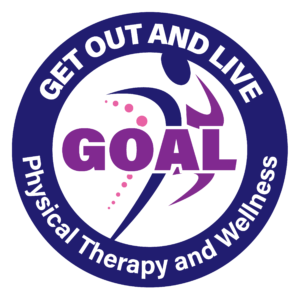
wner of GOAL Physical Therapy and Wellness, Dr. Tiffany Dallas – Kish. She offers many services with a personal touch that you won’t find in other physical therapy companies. Please consider her services for your physical therapy needs.
Are you peeing your pants? Do you have frequent urgency or need to pee even though you just went? Are you having pain with sexual intercourse that may be putting a strain on your relationship? Are you having pain or heaviness in your lady parts throughout the day? Do you not feel yourself “down there” after having a baby? You are not alone! These are very common and real issues that many women deal with on a daily basis. Many of these women haven’t told anyone about it, maybe because they are embarrassed or ashamed; or maybe they’ve been told “that’s normal” by their doctor or friend. Whatever the case may be, know that there are options that can help you resolve many of these issues! Pelvic floor physical therapy is one option often used in combination with other treatments to manage or resolve these frustrating problems. We are going to discuss what pelvic floor physical therapy is and what it may help with.
s a buzz word that has been thrown around a lot lately, so maybe you are aware of what the pelvic floor is and maybe you aren’t, and that’s okay! The pelvic floor refers to a sling of muscles that reside in the bottom of your pelvis, hence the “floor” of your pelvis. Every person has a pelvic floor… yes, even men do! These muscles are essential to being able to pee, poop, and have sex in a normal and pain-free manner. They are also important to help manage pressure throughout your core in order to be able to lift, run, jump, sneeze, cough and laughs without issues.
There are 3 layers of muscles to the pelvic floor, of which we will not get into detail in this blog, but do understand that each of these layers serve their own respective functions as well as function as a whole. The pelvic floor muscles need to be able to contract and relax at the appropriate times, just like any other muscles in your body. When the function and coordination of these muscles are impaired, oftentimes you will notice various symptoms.
Let’s first discuss what happens if the pelvic floor muscles are not contracting appropriately or are weak. You will often see urinary and /or fecal incontinence (yes, poop) where you are leaking either at random times, with physical exertion, or you just didn’t quite make it to the bathroom in time. You may also feel heaviness or pressure in your vaginal area throughout the day that typically gets worse as the day goes on or after certain physical activities. If your muscles aren’t strong enough or not contracting appropriately, this can also lead to difficulty or inability to achieve orgasm as the muscles must be able to contract in order to do this.
Now on the flip side, let’s chat about what happens when the pelvic floor muscles are too tight and are not relaxing like they should. Once the muscles contract, they absolutely need to be able to relax after, again, just like any other muscle in your body. If these muscles are having a difficult time relaxing, you may have difficulty with penetrative sexual activity, gynecological vaginal exam, or tampon insertion — as these will often cause pain at or inside the vagina. The muscles need to relax in order to stretch as anything is penetrating the vagina, otherwise the muscles will create a block and limit the ability to perform this activity. Obviously this can create quite a strain personally and within a relationship, so it’s important to know there is help for this issue! Also keep in mind, if the pelvic floor muscles are not relaxing and are chronically to tight you may also experience: difficulty initiating urine stream, feeling like you are unable to fully empty your bladder or bowels, chronic straining with bowel movements or constipation, painful urination or defecation, tenderness or sensitivity to touch near your lady parts, and sometimes pain in your hips, tailbone, or low back. In order to urinate or have a bowel movement, your pelvic floor muscles must relax. If they do not, you will often develop some of the aforementioned symptoms.
There is so much more to pelvic floor physical therapy than this but in a nutshell, this is what the pelvic floor muscles do and how they can wreak havoc on normal functions of the human body. Pretty important, huh? Pelvic floor physical therapists work closely with other healthcare providers in order to provide the best care and outcomes for our patients dealing with pelvic floor issues and other related factors. We should all have a power team which may include a physical therapist, mental health specialist, medical doctor, urogynecologist, massage therapist, personal trainer, and many more! I hope this blog was at least informative to you and may even helped shed some light on issues you may be personally dealing with. If so, reach out for help! We are here for you.



One response
Good to know!